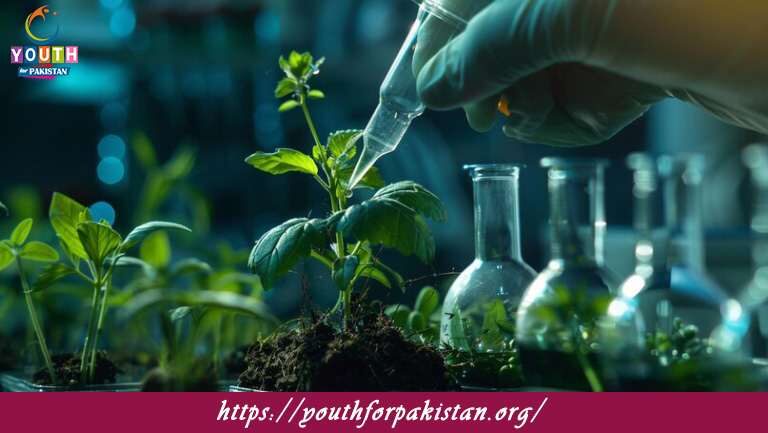Welcome to the 12th Class Biology Chapter 23 MCQs Practice and Quiz Tests. We are presenting you with top MCQ questions from the 12th Class Biology Chapter 23 Biotechnology.
You can find all the 12th Class Biology Chapter 23 MCQs online tests on our website. These online tests are great for learning and as well as for scoring maximum marks in your Intermediate Exams. We are making these Class 12 Biology MCQs online tests for those who want full marks in their exams.
What is the basic unit of genetic information?
a) Protein
b) Gene
c) Chromosome
d) Enzyme
Which of the following is used to cut DNA at specific sequences?
a) RNA polymerase
b) DNA helicase
c) DNA ligase
d) Restriction enzymes
What is the process of creating multiple copies of a DNA fragment?
a) PCR (Polymerase Chain Reaction)
b) Gel electrophoresis
c) Western blotting
d) Northern blotting
Which of the following is used to visualize DNA fragments after gel electrophoresis?
a) X-ray
b) UV light
c) Infrared light
d) Gamma rays
Which enzyme is responsible for synthesizing a complementary RNA strand from a DNA
template?
a) DNA polymerase
b) RNA polymerase
c) Reverse transcriptase
d) Ligase
What is the purpose of using a vector in gene cloning?
a) To amplify the DNA fragment
b) To introduce foreign DNA into a host cell
c) To cut the DNA at specific sequences
d) To visualize DNA fragments
Which biotechnological technique is used to detect gene expression levels?
a) Southern blotting
b) Northern blotting
c) Western blotting
d) Eastern blotting
Which of the following organisms is commonly used as a host for gene cloning?
a) E. coli
b) Saccharomyces cerevisiae
c) Arabidopsis thaliana
d) Caenorhabditis elegans
What is the purpose of CRISPR-Cas9 technology in biotechnology?
a) DNA amplification
b) Gene editing
c) Protein purification
d) DNA sequencing
Which technique is used to determine the sequence of nucleotides in a DNA molecule?
a) Polymerase Chain Reaction
b) DNA sequencing
c) DNA microarray
d) Southern blotting
What is the purpose of the “sticky ends” created by restriction enzymes?
a) To seal the DNA fragment into the vector
b) To bind the DNA fragment to the gel during electrophoresis
c) To facilitate annealing with complementary DNA fragments
d) To make the DNA fragments visible under UV light
In gel electrophoresis, smaller DNA fragments move faster than larger ones because:
a) They have a higher negative charge
b) They are lighter in weight
c) They are more resistant to the gel matrix
d) They are less affected by the electric field
Which of the following is a genetically modified organism (GMO)?
a) Golden rice with increased vitamin A content
b) Organic tomatoes grown without pesticides
c) Wild strawberries in their natural habitat
d) Cucumber seeds with improved germination rate
What is the function of reverse transcriptase in retroviruses?
a) It synthesizes RNA from a DNA template
b) It synthesizes DNA from an RNA template
c) It repairs damaged DNA strands
d) It regulates gene expression
Which of the following is a application of biotechnology in agriculture?
a) Cloning endangered species
b) Producing human insulin
c) Engineering drought-resistant crops
d) Treating genetic disorders
The process of transferring genes from one organism to another is known as:
a) Transcription
b) Translation
c) Transformation
d) Transduction
Which of the following techniques is used to amplify a specific DNA sequence in vitro?
a) Western blotting
b) Southern blotting
c) Polymerase Chain Reaction (PCR)
d) Northern blotting
The process of introducing foreign DNA into a host organism is known as:
a) Gene expression
b) Gene cloning
c) Gene transfer
d) Gene knockout
Which of the following enzymes is used to seal the nicks in the sugar-phosphate backbone of DNA during gene cloning?
a) DNA ligase
b) RNA polymerase
c) DNA polymerase
d) Reverse transcriptase
What is the primary goal of genetic engineering in humans?
a) Creating designer babies
b) Eliminating all genetic disorders
c) Enhancing intelligence in all individuals
d) Treating genetic diseases and disorders
Which of the following is a tool used to analyze the expression levels of multiple genes simultaneously?
a) PCR
b) DNA sequencing
c) Microarray
d) CRISPR-Cas9
Which technique is used to transfer genes into plant cells?
a) Electroporation
b) Lipofection
c) Microinjection
d) Agrobacterium-mediated transformation
What is the purpose of using selectable markers in gene cloning experiments?
a) To visualize the DNA fragments on a gel
b) To identify transformed cells from non-transformed cells
c) To determine the DNA sequence of the gene of interest
d) To detect gene expression levels
What is the role of the “promoter” in gene expression?
a) It determines the final protein structure
b) It initiates transcription of the gene
c) It enhances the translation process
d) It stabilizes the mRNA molecule
Which of the following is an example of a genetically modified organism used in medicine?
a) Herbicide-resistant crops
b) Bioluminescent bacteria
c) Insulin-producing bacteria
d) Fast-growing trees
The process of cutting and rejoining DNA from different sources is called:
a) Genetic engineering
b) Recombinant DNA technology
c) DNA replication
d) DNA ligation
Which enzyme is responsible for adding nucleotides to the growing RNA strand during transcription?
a) DNA polymerase
b) RNA polymerase
c) Reverse transcriptase
d) Ligase
What is the function of Taq polymerase in the Polymerase Chain Reaction (PCR)?
a) It synthesizes RNA from a DNA template
b) It synthesizes DNA from an RNA template
c) It synthesizes DNA from a DNA template
d) It seals the nicks in the DNA backbone
Which of the following is a technique used to analyze protein expression in a sample?
a) PCR
b) Western blotting
c) DNA sequencing
d) Northern blotting
What is the purpose of using dideoxynucleotides in DNA sequencing?
a) To synthesize complementary RNA strands
b) To amplify DNA fragments
c) To terminate DNA strand synthesis at specific positions
d) To cut DNA at specific sequences
Which of the following is an example of a genetically modified crop plant?
a) Wild strawberry
b) Wheat with increased gluten content
c) Organic tomato
d) Corn in its natural habitat
Which of the following is used as a selectable marker in many gene cloning experiments?
a) GFP (Green Fluorescent Protein)
b) Insulin
c) LacZ gene
d) Beta-actin gene
Which of the following biotechnological techniques is used to identify individuals based on their DNA profiles?
a) DNA sequencing
b) PCR
c) DNA fingerprinting
d) Western blotting
In gene cloning, what is the purpose of using a plasmid as a vector?
a) To amplify the DNA fragment
b) To visualize the DNA fragment
c) To facilitate gene expression
d) To introduce foreign DNA into a host cell
Which of the following is an example of a biotechnological product used in the textile industry?
a) Recombinant DNA
b) Antibiotics
c) Enzymes for dyeing
d) Vaccines
Which technique is used to separate DNA fragments based on their size during gel electrophoresis?
a) Affinity chromatography
b) Ion-exchange chromatography
c) Size-exclusion chromatography
d) Agarose gel electrophoresis
What is the primary role of ligase in gene cloning?
a) It cuts DNA at specific sequences
b) It joins DNA fragments together
c) It synthesizes RNA from a DNA template
d) It amplifies DNA fragments
Which of the following is an example of a biotechnological application in environmental conservation?
a) Cloning endangered species
b) Producing genetically modified crops
c) Manufacturing antibiotics
d) Developing new cancer treatments
Which enzyme is used to produce cDNA from mRNA in reverse transcription?
a) DNA polymerase
b) RNA polymerase
c) Reverse transcriptase
d) Ligase
What is the purpose of using “housekeeping genes” in gene expression studies?
a) To amplify DNA fragments
b) To measure the expression of constitutively active genes
c) To identify DNA sequences of interest
d) To produce proteins for medical use
Which of the following is a technique used to introduce specific mutations in a gene sequence?
a) PCR
b) Gel electrophoresis
c) Site-directed mutagenesis
d) DNA microarray
What is the function of the “operator” in gene expression regulation?
a) It enhances the translation process
b) It initiates transcription of the gene
c) It binds to specific regulatory proteins
d) It stabilizes the mRNA molecule
Which of the following techniques is used to detect specific DNA sequences in a sample?
a) PCR
b) Southern blotting
c) Western blotting
d) Northern blotting
Which of the following is a genetically modified animal used for medical research?
a) Transgenic mouse
b) Wild rabbit
c) Unmodified cat
d) Genetically engineered fish
Which of the following is a technique used to determine the expression levels of genes in a sample?
a) DNA sequencing
b) PCR
c) Northern blotting
d) Microarray
Which enzyme is responsible for copying the DNA template during PCR?
a) DNA polymerase
b) RNA polymerase
c) Reverse transcriptase
d) Ligase
Which of the following is an example of a genetically modified microorganism used in food production?
a) Antibiotic-resistant bacteria
b) Bioluminescent fungi
c) Cheese with increased calcium content
d) Yeast with enhanced fermentation capacity
What is the function of the Cas9 enzyme in CRISPR-Cas9 technology?
a) It synthesizes RNA from a DNA template
b) It cuts DNA at specific sequences
c) It synthesizes DNA from an RNA template
d) It repairs damaged DNA strands
What is the purpose of using a cDNA library in gene cloning experiments?
a) To amplify DNA fragments
b) To analyze gene expression
c) To determine DNA sequence information
d) To visualize DNA fragments
Which technique is used to introduce exogenous DNA into animal cells?
a) Electroporation
b) Agrobacterium-mediated transformation
c) Microinjection
d) Lipofection
What is the role of ligase in DNA replication?
a) It unwinds the double-stranded DNA
b) It synthesizes RNA primers
c) It joins Okazaki fragments on the lagging strand
d) It stabilizes the replication fork
Which of the following is a technique used to determine the presence of a specific protein in a sample?
a) PCR
b) Western blotting
c) Northern blotting
d) DNA sequencing
Which of the following is an example of a genetically modified animal used for agricultural purposes?
a) Transgenic pig
b) Wild deer
c) Unmodified horse
d) Genetically engineered snake
What is the purpose of using antibiotics in gene cloning experiments?
a) To kill the host organism
b) To treat bacterial infections
c) To select for cells that have taken up the recombinant DNA
d) To prevent the growth of bacteria
Which of the following is an example of a biotechnological application in medicine?
a) Producing biofuels
b) Creating genetically modified crops
c) Engineering bacteria for environmental cleanup
d) Manufacturing vaccines
What is the purpose of using a control group in biotechnological experiments?
a) To compare the results with other experiments
b) To ensure that the experimental group is large enough
c) To provide a baseline for comparison
d) To reduce the cost of the experiment
Which of the following techniques is used to determine the genetic relatedness between individuals or species?
a) DNA sequencing
b) DNA fingerprinting
c) PCR
d) Western blotting
What is the purpose of using reverse transcriptase in cDNA synthesis?
a) To amplify DNA fragments
b) To synthesize RNA from a DNA template
c) To synthesize DNA from an RNA template
d) To stabilize the mRNA molecule
Which of the following is an example of a genetically modified microorganism used in environmental cleanup?
a) Antibiotic-resistant bacteria
b) Bioluminescent fungi
c) Oil-degrading bacteria
d) Yeast with enhanced fermentation capacity
What is the primary goal of gene therapy in medicine?
a) To create genetically modified crops
b) To clone animals for research purposes
c) To cure genetic disorders by replacing or repairing faulty genes
d) To enhance the performance of athletes through genetic modifications
If you are interested to enhance your knowledge regarding Physics, Chemistry, Biology, and Computer please click on the link of each category, you will be redirected to dedicated website for each category.










